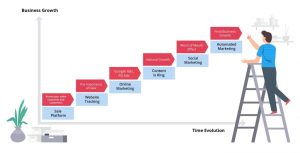
In today’s digital era, small businesses have a remarkable opportunity to transform their operations and achieve unprecedented success through effective digital marketing strategies
By harnessing the power of digital platforms and tools, small businesses can reach a broader audience, build brand awareness, and drive significant growth. This article delves into the transformative potential of digital marketing and highlights key strategies that can help small businesses transition from zero to hero
Establish a Strong Online Presence:
The first step towards transforming a small business is establishing a robust online presence. Create a professional website that showcases your products or services and represents your brand effectively. Ensure that your website is user-friendly, mobile-responsive, and optimized for search engines. By investing in a well-designed and optimized website, small businesses can attract and engage potential customers and lay the foundation for further growth.
Leverage Search Engine Optimization (SEO):
Search Engine Optimization (SEO) is crucial for small businesses to enhance their visibility in search engine results and drive organic traffic to their websites. Conduct thorough keyword research to identify relevant search terms that your target audience is likely to use. Optimize your website’s content, meta tags, headers, and URLs with these keywords. Focus on providing valuable, high-quality content that aligns with search intent, as search engines prioritize user experience and relevant results.
Utilize Content Marketing:
Content marketing is a powerful strategy for small businesses to establish thought leadership, engage their audience, and drive conversions. Develop a content marketing plan that includes blog posts, articles, videos, podcasts, and infographics. Create content that addresses your target audience’s pain points, educates them, and offers solutions. By consistently delivering valuable content, small businesses can build trust, establish their expertise, and attract a loyal customer base.
Embrace Social Media Marketing:
Social media platforms provide an incredible opportunity for small businesses to connect with their target audience and build a strong online community. Identify the social media channels that are most relevant to your industry and audience demographics. Develop a social media marketing strategy that includes engaging content, regular posting, and active interaction with followers. Leverage social media platforms to share updates, promote products or services, respond to customer inquiries, and showcase your brand’s personality.
Harness the Power of Email Marketing:
Email marketing remains an effective tool for nurturing leads, fostering customer relationships, and driving conversions. Build an email list by offering valuable content or exclusive offers to website visitors. Segment your email list based on demographics, preferences, and past interactions to personalize your messaging. Send targeted email campaigns that provide value, such as personalized product recommendations, exclusive discounts, or informative newsletters. By nurturing leads and staying top of mind, small businesses can drive repeat sales and customer loyalty.
Tap into Influencer Partnerships:
Collaborating with influencers can significantly boost brand awareness and credibility for small businesses. Identify influencers in your industry who align with your brand values and have a genuine connection with your target audience. Partner with influencers to promote your products or services through sponsored content, reviews, or social media mentions. Influencers’ reach and engagement can introduce your brand to new customers and generate buzz, driving exponential growth for your small business.
Embrace Data Analytics:
Data analytics is a game-changer for small businesses, providing valuable insights into customer behavior, campaign performance, and overall business growth. Utilize analytics tools to track website traffic, user engagement, social media metrics, and email campaign performance. Analyze this data to identify trends, optimize marketing strategies, and make data-driven decisions. By continuously monitoring and analyzing data, small businesses can identify areas for improvement and seize growth opportunities.
Conclusion:
Digital marketing has the power to transform small businesses and propel them from zero to hero. By establishing a strong online presence, leveraging SEO techniques, embracing content marketing, utilizing social media platforms, harnessing email marketing, tapping into influencer partnerships, and utilizing data analytics, small businesses can drive remarkable growth, expand their customer base, and achieve long-term success in the digital age. With the right digital marketing strategies, small businesses can unleash their full potential and become industry leaders.

